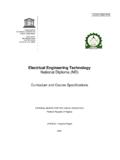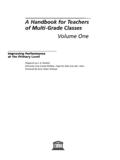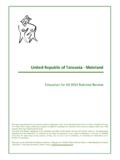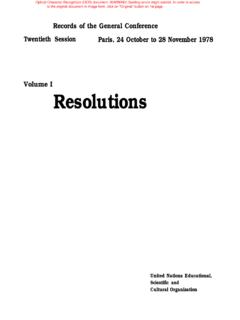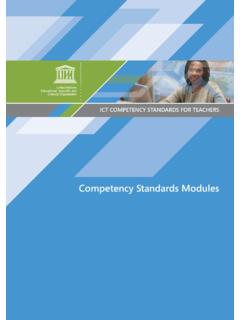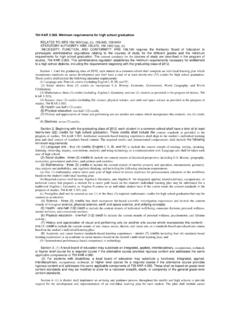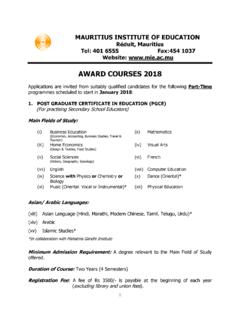Transcription of Science Laboratory Technology Chemistry Option - UNESCO
1 ED/STV/2004/PI/16. Science Laboratory Technology Chemistry Option Higher National diploma (HND). Curriculum and Course Specifications NATIONAL BOARD FOR TECHNICAL EDUCATION. Federal Republic of Nigeria UNESCO Nigeria Project 2004. Science Laboratory Technology Chemistry Option - Higher National diploma (HND). Curriculum and Course Specifications November 2004. NATIONAL BOARD FOR TECHNICAL EDUCATION. Produced by the National Board for Technical Education (NBTE). Plot B, Bida Road, 2239, Kaduna Nigeria. TABLE OF CONTENTS. GENERAL 2.
2 CURRICULUM TABLE .. 5. FIRST YEAR - FIRST 6. Course: Inorganic Chemistry I .. 6. Course: Physical Chemistry 12. Course: Organic Chemistry 20. Course: Analytical Chemistry I .. 30. Course: Laboratory Management .. 41. Course: General Instrumentation .. 48. Course: Higher Technical 55. FIRST YEAR - SECOND 59. Course: Polyfunctional 59. Course: Physical Chemistry II - (Chemical Kinetics).. 66. Course: Industrial Chemistry .. 73. Course: Analytical Chemistry II .. 85. Course: Biochemistry for Chemists .. 94. Course: Biological and Chemical 105.
3 Course: Research 117. SECOND YEAR - FIRST 124. Course: Inorganic Chemistry II .. 124. Course: Physical Chemistry III (Chemical Thermodynamics) .. 131. Course: Organic and Heterocyclic Chemistryh .. 139. Course: Analytical Chemistry III .. 147. Course: Petroleum and Petrochemicals .. 156. Course: Computer Applications in Chemistry .. 163. Course: Small Business Management II .. 173. SECOND YEAR - SECOND 180. Course: Medicinal 180. Course: Physical Chemistry IV (Electrochemistry and Photochemistry) .. 190. Course: Natural Products and Stereochemistry.
4 198. Course: Food Chemistry and 206. Course: Forensic Biochemistry .. 214. Course: Higher Practical Project and Seminar .. 219. 1. GENERAL INFORMATION. CERTIFICATION AND TITLE OF THE PROGRAMME: The certificate to be awarded and the programme title shall read: HIGHER NATIONAL diploma IN Science Laboratory Technology - Chemistry Option . A transcript showing all the courses taken and grades obtained shall be issued on demand. STRUCTURE OF PROGRAMME. The Higher National diploma programme is structured to last for two years (four semesters).
5 EVALUATION OR AWARD. All terminal Higher National diploma programmes must be externally moderated after every five years. In grading the awards the Board's unified grading system should be applied. ACCREDITATION. All programmes leading to the award of Higher National diploma in Chemistry must be accredited by the National Board for Technical Education. Details of accreditation of programmes are available from the Executive Secretary Programmes Department, National Board for Technical Education, Plot B' Bida Road, 2239, Kaduna, GOALS AND OBJECTIVES.
6 The Higher National diploma Programme in Chemistry is designed to produce technologists capable of carrying out various Laboratory analysis and practical works independently. Specifically 1. Carry out chemical analysis and quality control in: industry (oil, food, brewing, detergent, textiles, etc.), hospitals, schools, colleges and research institutions. 2. Carry out general chemical work in industrial and academic laboratories. 3. Assist in biochemical analysis and experiments in hospitals, schools, colleges and research institutes 4.
7 Prepare students for employment in related work such as sales, marketing, administration and management in the industries in 1 above and, also, for self-employment. ENTRY REQUIREMENTS: HIGHER NATIONAL diploma . The entry requirement into Higher National diploma Programme in Science Laboratory Technology - Chemistry is at least a Lower Credit grade in National diploma in Science obtained from an accredited Science programme with one year supervised Industrial Experience. In exceptional cases, at least two years Industrial Experience for candidates with Pass grade or any other equivalent certificate .
8 2. CURRICULUM. The curriculum of the HND programme consists of three main components. These are: (a) General studies/education (b) Foundation courses (c) Professional courses The General Studies/Education component shall include courses in: Language and Communication - English language and communication. This is compulsory. and Social Studies- Citizenship (the Nigeria constitution) is compulsory. The General Education component shall account for not more than 10% of total contact hours for the programme. Foundation Courses - Courses in mathematics and computer studies.
9 The number of hours will vary with the programme and may account for about 10-15% of the total contact hours. Professional Courses - Courses which give the student the theory and practical skills he needs to practice his field of calling at the technician / technologist level. These may account for between 60-70% of the contact hours depending on programme. CURRICULUM STRUCTURE. HND Programme: The structure of the HND Programme consists of four semesters of classroom, Laboratory and workshop activities in the college. Each semester shall be of 17 weeks duration made up as follows: 15 contact weeks of teaching, lecture and practical exercises, etc.
10 And 2 weeks for tests, quizzes, examinations and registration. CONDITONS FOR THE AWARD OF THE ND. Institutions offer accredited programmes for the award of the Higher National diploma to candidates who successfully complete the programme after passing prescribed course work, examinations and project. Such candidates should have completed a minimum of between 90% and 100% of credit units depending on the programme. Higher Diplomas shall be awarded based on the following classifications: Distinction - CGPA Upper credit - CGPA Lower Credit - CGPA Pass - CGPA GUIDANCE NOTES FOR TEACHERS TECHING THE PROGRAMME.

